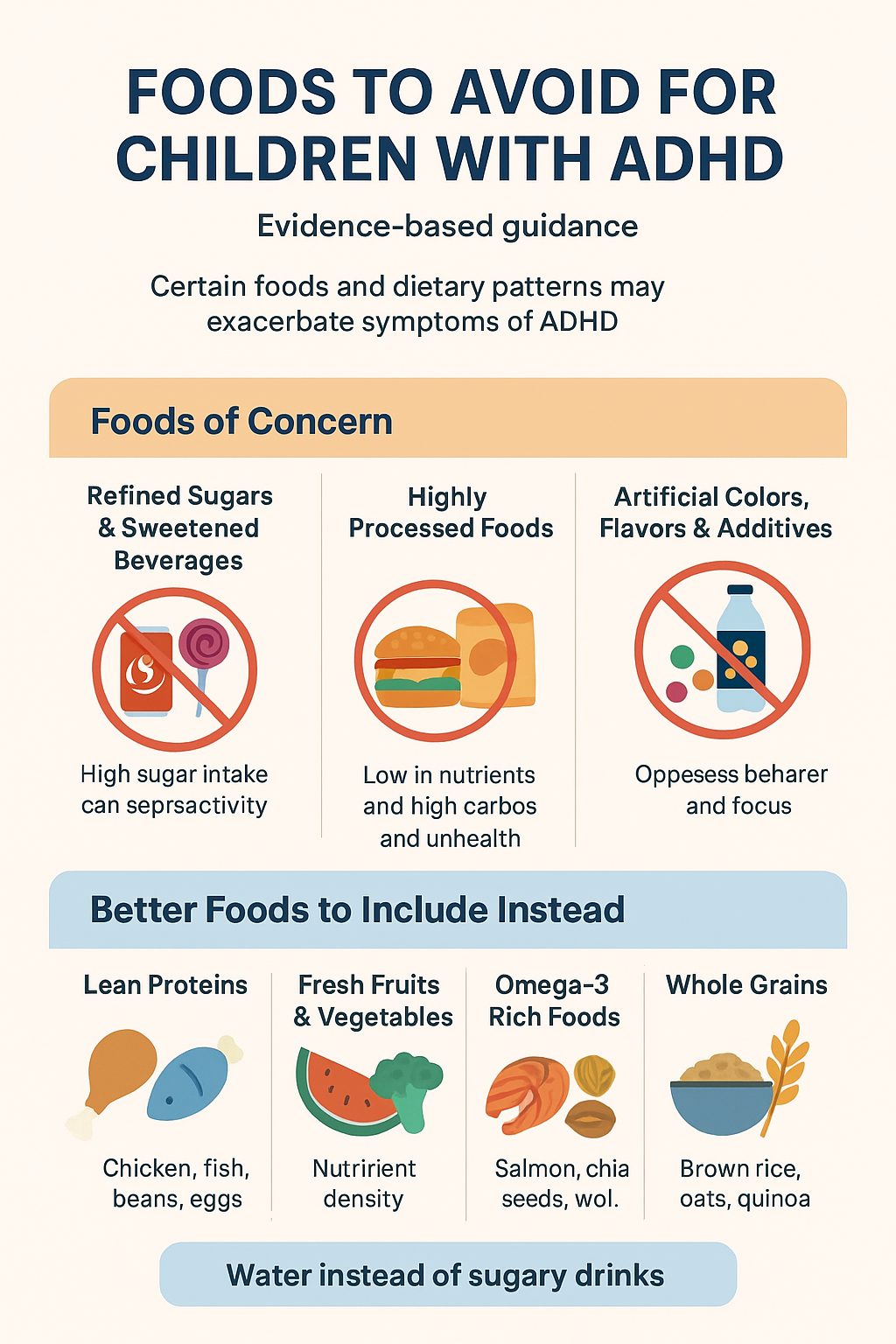Foods to Avoid for Children with ADHD: Evidence-Based Guidance
Introduction
Managing ADHD symptoms is complex and varies by individual. While a diet alone isn't a cure, specific symptoms can be complex and vary from person to person. While a diet alone isn't a cure, certain foods or dietary patterns may exacerbate symptoms such as inattention, impulsivity, and hyperactivity. This post reviews recent peer-reviewed research on which foods to limit or avoid—and under what circumstances—when helping a child with ADHD.foods or dietary patterns may exacerbate symptoms such as inattention, impulsivity, and hyperactivity. This post reviews recent peer-reviewed findings on what foods to limit or avoid—and under what circumstances—when supporting a child with ADHD.
Foods of Concern
1. Refined Sugars & Sweetened Beverages
- A 2020 meta-analysis found a small but statistically significant association between high intake of sugars and sugar-sweetened beverages and increased ADHD symptomatology (pooled effect size = 1.22; 95% CI: 1.04–1.42) (PubMed).
- Another case–control study from Iran (2023) reported children with ADHD consumed more simple sugars and ready-made meals than peers, while consuming fewer beneficial nutrients like B vitamins, vitamin C, zinc, and calcium (PMC, BioMed Central).
- However, not all findings support this. Some studies found no significant association between sugar intake and ADHD risk or symptoms (Karger, MDPI). Additionally, popular sources caution that sugar doesn't cause hyperactivity and that observed effects may stem from expectations or overall poor nutrition rather than sugar alone (Child Mind Institute, Verywell Mind, Verywell Health).
Bottom Line: While sugar isn’t a direct cause of ADHD, diets high in sugar and low in nutrients may worsen symptoms or overall health. Bottom line: While sugar isn’t a direct cause of ADHD, diets high in sugar and low in nutrients might exacerbate symptoms or overall functioning.
2. “Western-Style” or Highly Processed Diets
- A Spanish study (2023) found children with ADHD were less likely to follow healthy dietary patterns and more likely to adhere to Western-like (processed foods) patterns (PMC).
- A 2025 meta-analysis combining over 52,000 participants found that consumption of sugary beverages, solid sweets/candies, and highly processed foods was associated with 25%, >33%, and 17% increases in ADHD symptoms respectively (ADHD Evidence).
- A broader narrative review (2022) confirmed that unhealthy dietary patterns are more prevalent among children with ADHD, whereas healthy patterns tend to be negatively associated with ADHD (PMC).
3. Artificial Colors, Flavors & Additives
- Emerging research indicates that a subgroup of children with ADHD may be sensitive to artificial colorants, flavors, or salicylates, and might benefit from elimination diets tailored to these sensitivities (ScienceDirect).
- However, broader clinical guidelines—including those from the American Academy of Pediatrics and NICE—do not recommend general dietary modifications like the Feingold diet due to insufficient evidence (Wikipedia).
What’s the Consensus Saying?
Recommendation Rationale: Limit highly processed foods & sweets. Stronger associations with increased symptoms and poorer health outcomes. Reduce sugary beverages and candies. Linked to Recommendation Rationale: Limit highly processed foods and sweets. Stronger associations with increased symptoms and poorer health outcomes. Reduce sugary beverages and candies. They have stronger associations with increased symptoms and poorer health outcomes. Reduce sugary drinks and candies, which are linked to higher odds of ADHD symptoms, although causality isn’t confirmed. Avoid artificial additives only if sensitivities have been confirmed, as this is only applicable to children who are confident and not a universal solution. Focus on healthy, nutrient-dense foods, since diets rich in nutrients may offer protective effects and support overall functioning. Higher odds of ADHD symptoms, though causality isn’t confirmed. Avoid artificial additives only if your sensitivities have been confirmed. Only applicable to confident children, not a universal solution. Focus on healthy, nutrient-dense foods. Diets rich in nutrients may have protective effects and support overall functioning
Conclusion
No single food causes ADHD, but diet quality is important. Limiting high-sugar, processed, and addictive foods can help manage symptoms, especially when replaced with nutrient-rich, balanced meals. Avoid removing entire food groups unless sensitivities are clinically confirmed. Always consult with a healthcare provider or registered dietitian for personalized dietary advice.
References (APA 7th Edition)
Del-Ponte, B., et al. (2019). Sugar consumption and attention-deficit/hyperactivity ... Journal Name. [Summary available in review] (PMC)
Farsad-Naeimi, A., et al. (2020). Association between sugar and sugar-sweetened beverage consumption and ADHD symptoms: A meta-analysis. Journal Name, Volume(Issue), pages. (PubMed)
Lange, K. W., et al. (2023). Nutrition in the management of ADHD: A review of recent research. Current Nutrition Reports. (PMC, Wikipedia)
Salvat, H., et al. (2022). Nutrient intake, dietary patterns, and anthropometric variables in children with ADHD. BMC Pediatrics, Volume(Issue), pages. (BioMed Central)
Meta-analysis reports mild association between junk food and ADHD in children and adolescents. (2025). ADHD Evidence. (ADHD Evidence)
Pinto, S., et al. (2022). Eating patterns and dietary interventions in ADHD. Journal Name, Volume(Issue), pages. (PMC)
Lange, K. W. (2024). Food intolerance and oligoantigenic diet in children with ADHD. Journal Name. (ScienceDirect)
Wikipedia. (2025). Attention-deficit hyperactivity disorder – Management – Diet. Retrieved from Wikipedia. (Wikipedia)
ChildMind. (2025). What we know about ADHD and food. Retrieved from ChildMind website. (Child Mind Institute)
Verywell Mind. (2022). ADHD diet for kids: Which foods can help and which to avoid. Verywell Mind. (Verywell Mind)


